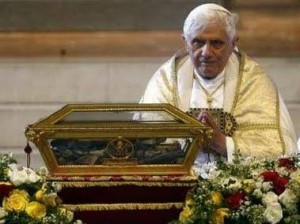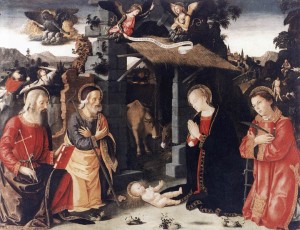 Too late loved I thee, O thou Beauty of ancient days, yet ever new! too late I loved thee! And behold, thou wert within, and I abroad, and there I searched for thee; deformed I, plunging amid those fair forms which thou hadst made. Thou wert with me, but I was not with thee. Things held me far from thee, which, unless they were in thee, were not at all. Thou calledst, and shoutedst, and burstest my deafness. Thou flashedst, shonest, and scatteredst my blindness. Thou breathedst odours, and I drew in breath and panted for Thee. I tasted, and hunger and thirst. Thou touchedst me, and I burned for thy peace.
Too late loved I thee, O thou Beauty of ancient days, yet ever new! too late I loved thee! And behold, thou wert within, and I abroad, and there I searched for thee; deformed I, plunging amid those fair forms which thou hadst made. Thou wert with me, but I was not with thee. Things held me far from thee, which, unless they were in thee, were not at all. Thou calledst, and shoutedst, and burstest my deafness. Thou flashedst, shonest, and scatteredst my blindness. Thou breathedst odours, and I drew in breath and panted for Thee. I tasted, and hunger and thirst. Thou touchedst me, and I burned for thy peace.
Tag: St Augustine
The Lord’s going to heaven
Today’s solemn feast of the Ascension Lord requires us to meditate on its meaning and place in our spiritual life these days leading up to the Pentecost. Here is an excerpt of a homily by Saint Augustine:
As he was about to ascend, he spoke the last words he was to utter on earth. At the moment of going up to heaven, the head commended to our care the members he was leaving on earth, and so departed. No longer will you find Christ speaking on earth; in the future he will speak from heaven. Why will he speak from heaven? Because his members are being trampled underfoot on earth. He spoke to Saul the persecutor from above, saying: ‘Saul, Saul, why are you persecuting me? I have ascended to heaven, but I still remain on the earth. Here at the Father’s right hand I sit, but there I still hunger and thirst and am without shelter’.
The meaning of Christ’s temptation
St. Augustine reflects on Mark 1:12-15, today’s gospel in the Novus Ordo:
“Jesus made us one with him when he chose to be tempted by Satan. We’ve heard in the gospel how the Lord Jesus Christ was tempted by the devil in the desert. Certainly Christ was tempted by the devil. In Christ you were tempted, for Christ received his flesh from your nature, but by his own power gained salvation for you; he suffered death in your nature, but by his own power gained life for you; he suffered insults in your nature, but by his own power gained glory for you; therefore, he suffered temptation in your nature, but by his own power gained victory for you.”
Peering into the Mystery of the Incarnation
The Lord your God is in your midst, a mighty Savior; He will rejoice over you with gladness, and renew you in his love. He will sing joyfully because of you, as one sings at festivals. (Zeph. 3: 14-18a)
I find myself at this time of year, with this feast, what does it mean that God has entered into my very circumstance. At leach of the Masses I genuflected at the part where the Incarnation was professed and wondered how at this moment there is a keen recognition of what the difference Jesus makes in world, among friends and enemies, indeed, all of life. A friend of mine said that Christmas reminds the baptized Christian that the Incarnation provides us the opportunity to know that God looks like us (but doesn’t act like us); God know the very circumstance of living. I spent so much time at the Christmas Masses wondering quietly —and aloud— about the fact of God’s gaze upon us through the Birth of His Son, Jesus. Asking myself, how is that God loves me so much that he peers into my existence in 2014? But, it is also how I peer into what God has so wonderfully done…
I think it is a true statement to say that Christmas is, more than any Christian celebration, a way to know that God is really in our midst. (Pascha has its own theological experience and data!) As my friend also said, “God’s involvement in our lives as the Word made Flesh, as Christ the Lord, as a real human being means that there is nothing in our lives that God cannot understand from personal experience.”
This sermon of the great Saint Augustine of Hippo helps me to consider anew what I profess to believe and to sharpen witness. Perhaps your meditation today and during the Octave will benefit from this sermon:
My mouth shall speak the praise of the Lord…by whom all things were made and who was made [flesh] amid all the works of His hands; who is the Manifestor of His Father, the Creator of His Mother; Son of God born of the Father without a mother, Son of Man born of a mother without a father; the great Day of the angels, small in the day of men; the Word as God existing before all time, the Word as flesh existing only for an allotted time; the Creator of the sun created under the light of the sun; ordering all ages from the bosom of His Father, from the womb of His Mother consecrating this day; remaining there, yet proceeding hither; Maker of heaven and earth brought forth on this earth overshadowed by the heavens; unspeakably wise, wisely speechless; filling the whole world, lying in a manger; guiding the stars, a nursling at the breast; though insignificant in the form of man, so great in the form of God that His greatness was not lessened by His insignificance nor was His smallness crushed by His might. When He assumed human form He did not abandon His divine operations… When clothed in the weakness of our flesh He was received, not imprisoned, in the Virgin’s womb so that without the Food of Wisdom being withdrawn from the angels we might taste how sweet is the Lord.
Why do we marvel at these conflicting powers of the Word of God when the discourse which I utter is apprehended so freely by the senses that the hearer receives it, yet does not confine it? If it were not received, it would give no instruction; if it were confined, it would not reach others. In spite of the fact that this discourse is divided into words and syllables…you all hear the whole discourse and each individual takes in the whole. While speaking, I do not fear that one listener may, by hearing me, grasp the whole discourse so that his neighbor can get nothing of it…Nor is this hearing accomplished at successive periods of time so that, after the dis- course which is being delivered has come to you first, it leaves you so that it may go to another person. No, it comes to all at the same time and the whole discourse is apprehended by each individual…How much more readily, then, would the Word of God, through whom all things were made and who, remaining in Himself, renews all things, who is neither confined by places nor restrained by time, neither changed by long or short intervals of time, neither adorned by speech nor terminated by silence, be able to make fertile the womb of His Mother when He assumed human flesh, yet not leave the bosom of His Father; to make His way hither for human eyes to gaze upon Him, and still to enlighten angelic minds; to come down to this earth while rul- ing the heavens; to become Man here while creating men there?
Let no one believe, then, that the Son of God was changed into the Son of Man; rather, let us believe that, with the perfect preservation of His divine nature and the perfect assumption of human nature, He, remaining the Son of God, became also the Son of Man. For the fact that the Scriptures say ‘The Word was God’ and ‘The Word was made flesh’ (Jn 1.1,14) does not mean that the Word became flesh in such a way as to cease to be God since, because the Word was made flesh, in that same flesh Emmanuel ‘God with us’ was born. …the word which we form within us becomes an utterance when we bring it forth from our mouth: the word is not changed into the utterance, but the voice by which it comes forth is taken on while the inner word remains un-changed; what is thought remains within, what is heard sounds forth. Nevertheless, the same thing is expressed in sound which had previously been expressed in silence…when the word becomes an utterance, it is not changed into this utterance, but remains in the light of the mind; having taken on the voice of the flesh, it reaches the listener without leaving the thinker…Both that which is considered in the mind, however, and that which sounds forth in speech are variable and diverse; the thought will not remain when you have forgotten it, nor will the utterance remain when you are silent. But the Word of the Lord remains forever and remains unchanged.
From Sermon 187: The Feast of the Nativity
Are you wearing the wedding garment of Charity?
A thought for today’s Scripture proclaimed at Sunday Mass today –St. Augustine taught:
“‘The goal of this command is charity,’ says the apostle, ‘which comes from a pure heart and a good conscience and a sincere faith.’ This is the wedding garment. Not charity of any kind whatever, for very often they who are partakers together of an evil conscience seem to love one another… But in these is no charity from a pure heart, a good conscience and a faith unfeigned. The wedding garment is charity such as this: ‘Though I speak with the tongues of men and of angels and have not charity, I have become like a sounding brass and a tinkling cymbal.’ Suppose someone who speaks in tongues comes in and is asked, ‘How did you get in here without a wedding garment?’ Suppose he answers, ‘But I have the gift of prophecy and understand all mysteries and all knowledge and I have all faith, so that I could remove mountains.’ But if he has no charity, he has nothing. Such may be the clothing of those who in fact lack the wedding garment.”
A Reflection for the 28th Sunday through the Year on Matthew 22:1-14
Stay in the Church, St Augustine exhorts
Today is the 19th Sunday through the Church year and we are reading at Mass Saint Matthew 14:22-33
A reflection on the reading from St. Augustine:
“The boat carrying the disciples – that is, the Church – is rocking and shaking amid the storms of temptation, while the adverse wind rages on. That is to say, its enemy the devil strives to keep the wind from calming down. But greater is he who is persistent on our behalf, for amid the vicissitudes of our life he gives us confidence. He comes to us and strengthens us, so we are not jostled in the boat and tossed overboard. For although the boat is thrown into disorder, it is still a boat. It alone carries the disciples and receives Christ. It is in danger indeed on the water, but there would be certain death without it. Therefore, stay inside the boat and call upon God. When all good advice fails and the rudder is useless and the spread of the sails presents more of a danger than an advantage, when all human help and strength have been abandoned, the only recourse left for the sailors is to cry out to God. Therefore, will he who helps those who are sailing to reach port safely, abandon his Church and prevent it from arriving in peace and tranquility?”
Augustine’s Prayer to the Holy Spirit
 Breathe in me, O Holy Spirit, that my thoughts may all be holy.
Breathe in me, O Holy Spirit, that my thoughts may all be holy.
Act in me, O Holy Spirit, that my work, too, may be holy.
Draw my heart, O Holy Spirit, that I love but what is holy.
Strengthen me, O Holy Spirit, to defend all that is holy.
Guard me, then, O Holy Spirit, that I always may be holy. Amen.
(St Augustine of Hippo)
Are you begging the Holy Spirit for a new outpouring of His gifts?
Lenten penance according to St Augustine: fast from discord, and forgive
For anyone still deciding what to give up for Lent, (Ash Wednesday is around the corner) or even for those who have decided, here’s a great suggestion from Saint Augustine that may be helpful:
“Before everything else, brothers and sisters, fast from quarrels and discord…. If you want to shout, use the kind of shouting about which [Scripture] says, ‘With my voice I shouted to the Lord’ {Psalm 142.1}. That indeed is not a shout of quarreling, but of loving; not of flesh, but the heart….
Forgive, and you will be forgiven; give, and it will be given to you’ {Luke 6.37-38}. These are the two wings of prayer, on which it flies to God; if you pardon the offender what has been committed, and give to the person in need.”
[Sermon 205, On the Beginning of Lent]
Watch Thou, O Lord
Perhaps you would like to join me in praying this prayer following the prayers at evening (Vespers) each night. It echoes the theme of “keeping watch” with Christ.
Evening Prayer of Saint Augustine
Watch Thou, O Lord, with those who wake, or watch, or weep tonight, and give Thine Angels and Saints charge over those who sleep.
O Lord Jesus Christ,
Tend Thy sick ones,
Rest Thy weary ones,
Bless Thy dying ones,
Soothe Thy suffering ones,
Pity Thy afflicted ones,
Shield Thy joyful ones,
And all for Thy love’s sake.
Evening Prayer Antiphon:
Protect us, Lord, as we stay awake,
watch over us as we sleep,
that awake, we may keep watch with Christ,
and asleep, rest in his peace.
Getting to the heart of what St Augustine teaches us today
 The Church put on the lips of the priest, and also on our own lips, yesterday this prayer at Mass:
The Church put on the lips of the priest, and also on our own lips, yesterday this prayer at Mass:
Renew in your Church, we pray, O Lord, that spirit with which you endowed your Bishop Saint Augustine that, filled with the same spirit, we may thirst for you, the sole fount of true wisdom, and seek you, the author of heavenly love.
I am stimulated by what we ask the Lord: to be filled with the same spirit as Augustine, thirsting for Him and seeking divine love.
Shortly into the papacy of Benedict XVI he went to pray before the relics of Saint Augustine in Pavia, Italy. When I saw this picture yesterday I immediately got to wondering why is Augustine so important to some, and irrelevant to others. Why does Augustine have such an crucial influence on us 1600 years after his death? The answer is still being formed but I think part of an answer is his capacity for friendship, and to relentlessly seek God.
The Augustinians are meeting for their 184th General Chapter and Pope Francis opened the Chapter with Mass. Here is a report on the gathering of the Augustinians with His Holiness.
BUT let me offer you an opportunity to hear what Saint Augustine’s spirituality is and how it is relevant to us today. I found a 2009 presentation on Augustinian spirituality given by Father Theodore E. Tack, OSA, who, at the time of his death in February (’13) been a professed member of the Augustinian friars for more than 60 years; he was the 93rd Prior General of the Augustinians, a headmaster, and until his death a high school teacher in Tulsa, OK. Tack gives a great overview of Christian life through the eyes of Saint Augustine.
Father Tack’s presentation, “The Relevance of Augustine for Young Adults Today,” is a very good introduction to the person and perduring influence of Augustine of Hippo. Like the Pope visiting the relics, we need to visit a man who has a profound influence on the Church. Don’t be fooled by the title; his presentation is really for all. He offered this work as the opening presentation for the Society of St Augustine at Villanova University.
